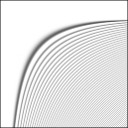 |
libftsh
A Fast Transform for Spherical Harmonics
|
 |
libftsh
A Fast Transform for Spherical Harmonics
|
Copyright (c) 2000-2012 Martin J. Mohlenkamp
This is the README file for libftsh, a library that implements a fast transform for spherical harmonics.
Further information may be found at http://www.ohiouniversityfaculty.com/mohlenka/ Please report bugs, missing/confusing instructions, suggested improvements, etc. to mohlenka@ohio.edu .
The library libftsh implements a fast transform for spherical harmonics. The difficult part of the transform is the Associated Legendre Transform portion, and this library only does that portion. The rest of the transform, such as the fourier transform in longitude, transpose, and overall data organization, is left up to the user.
The fast transform implemented is based on the paper: A Fast Transform for Spherical Harmonics Martin J. Mohlenkamp Journal of Fourier Analysis and Applications, 5(2/3):159-184, 1999.
Within the TEST directory are examples of how to use these routines. The TEST/README file there will direct you to the proper files and run you through an example session.
Thanks to Ronald Coifman (Yale U) for advising me on this (my thesis) project.
Thanks to Gregory Beylkin (U of Colorado) for helping me improve the implementation.
Thanks to Andrew DienstFrey (NIST) and Bill Spotz (NCAR) for helping test the code.
Thanks to Dean Allen Provins (U of Calgary) and Yue Shi Lai (Columbia U) for pointing out bugs.
This material is based upon work supported by the National Science Foundation.
 1.8.0
1.8.0